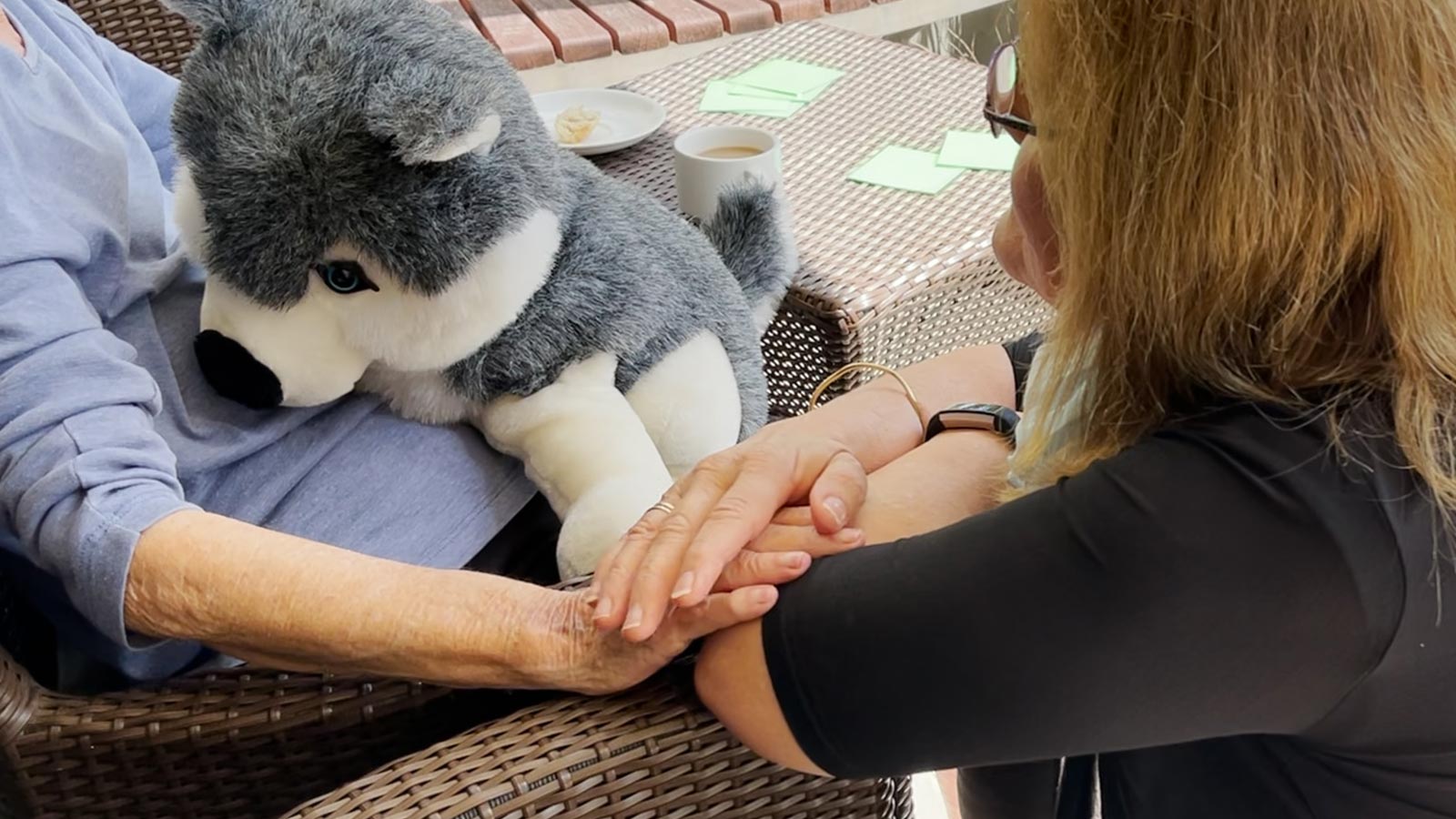Living well with dementia

Dementia affects 472,000 people in Australia. However, there’s still much to understand about this disease and its impact on lives. In this episode we talk to Blue Care’s Nerida Pankhurst to learn about her work as a dementia consultant, what it means to be living with dementia and practical tips for carers, so you and your loved one can continue to live a rich and fulfilling life.
Listen to more episodes
You can listen to more episodes of Positive Ageing and subscribe to the podcast.
See all podcastsSubscribe to the podcast
Transcript
Nerida Pankhurst: My dream and my hope is that we can start looking at the person. This is a person and yeah, they’re living with dementia, but seeing that person.
Host: As a dementia consultant, Nerida Pankhurst is on the front line, caring for some of Queensland’s most vulnerable people and supporting their families.
Nerida Pankhurst: A lot of the myths around it are: “If I’ve got a bad memory, I must have dementia.” And that’s not what dementia is. A normal part of ageing is to have a bit of memory loss. So, you know, memory loss with a loss of functionality of the body – there’s the difference, there that becomes dementia.
Host: Welcome to Positive Ageing, a podcast that explores how to live well in your senior years and the importance of getting help early to live life your way in retirement. Today, we delve into what it means to be living with dementia. We offer practical tips to assist in caring for your loved one who’s been diagnosed, and we talk about what it’s like to be working as a BlueCare dementia consultant.
Nerida Pankhurst: It’s interesting the response that people get. Some people go: “I knew something was wrong. Now you’ve actually given me a name for it.” So some people are actually relieved to get a diagnosis. So that’s interesting.
Some people just want to know more about it. I know there’s a gentleman that I visit at the moment who I spend my full hour – he asks me questions about dementia and what’s going to happen. And he wants to know all about it and, you know, I talk to him about wellness, I talk to him about, you know, keeping his mind active. And the next time that I go to visit I’m taking some cards for him so that he can do some matching or maths quizzes and I’ve zeroed in that he really likes numbers and he’s good at numbers. So we want to build on that. So, it’s about keeping the person’s mind active for as much capacity that they have using that.
Host: For 23 years, Nerida Pankhurst has been with BlueCare, providing dementia support. Two years ago, she was chosen to be part of the Dementia Support Australia pilot program as an Industry Partner Dementia Consultant. The goal: to build capacity within BlueCare to provide a better quality of life for people living with dementia.
Nerida Pankhurst: I love my job. I love my job and I love doing what I’m doing right now. And the reason I love it is that I know that it makes a difference in supporting people in their home. It’s been needed for such a long time and being a part of that process and being like the first person in BlueCare that’s doing that is, it’s just amazing. But I love my work.
Host: Nearly half a million Australians are living with dementia and almost 1.6 million are involved in their care. Dementia affects the brain and impacts a person’s thinking, behaviour and the ability to perform everyday tasks. Despite this, Nerida believes there’s a positive way for families to move forward into a new way of living.
Nerida Pankhurst: I think they need to understand that getting a diagnosis of dementia is not the end. It’s the beginning of a journey in the person’s life. People can still live well with dementia. There’s lots of support that people living with dementia can get to live well.
Host: The words “wellness” and “dementia” are not often heard in the same sentence, but Nerida says it’s the key to a happier life for those living with it and their loved ones.
Nerida Pankhurst: I talk a lot to carers about wellness and dementia. Now let’s just have this person – we know that they may be affected by this, what dementia is doing to their brain – but let’s make sure they’re well; everything else around them is well. Hydration and their diet and exercise and being socially engaged is really important. So, let’s get all those things right to help the person live well.
Host: Connecting them with positive memories can be critical.
Nerida Pankhurst: So we might know that the person can’t draw on short-term memories, and that’s OK. But those long-term memories are still there. It’s just igniting those because they’re very vivid, especially if there’s emotion attached to them. Just recently there was a lady talking about the beach and I said, “Well, how about if one of our workers could pick you up and take you down to the beach, how would that be?” She said: “That’d be great!” And her husband said: “Well, you used to go with your friends to the coffee shop too.” She said: “I did!” And she clapped her hands like in excitement. And I thought there’s another thing. A simple thing that is a little thing to us is a big thing for somebody else.
Host: During the challenging times, Nerida recommends those caring for loved ones take a moment to step back and breathe.
Nerida Pankhurst: I think one of the things that’s quite common with dementia is repetitiveness – so the person saying the same thing over and over or asking the same question over and over. Now sometimes I might see a level of stress around the carer, saying: “I’ve already told you that, I told you that just before.” So getting that carer to understand that the last time the person heard it is the first time they’re hearing it. So, and understanding that and just relaxing. You know, I gave some advice to a carer on my last visit, and said: “Relax, just breathe.” You know sometimes the response can just be: “OK.” So rather than, “No, you’re wrong. No, I've told you that.” It can just be: “OK.”
Host: She says children can also learn how to have a positive a relationship with Grandma or Grandpa.
Nerida Pankhurst: So, I sometimes worked with the younger members, and give them an understanding what dementia is, and that it’s not scary. It’s just that there’s some changes in the brain and they affect the person. So, that’s really helpful as well because some families are, you know, really struggling because the grandkids have shied away from the grandparent and having little contact with them. So that’s been a really good outcome as well. So, looking at the family as a whole and, you know, what support can I give for all generations?
Host: Nerida says BlueCare’s dementia at-home care and respite services can help give carers the break and the support they need. It’s also important for carers to understand that asking for help is beneficial for both them and their loved one.
Nerida Pankhurst: We know the person living with dementia is affected by their dementia. But my primary, I suppose, is helping the carer to live well. Because whilst they live well, they can care for that person in the home. So I really want to build that trustful relationship where they know that they can call on me, they can call our service, they can get that support.
Host: Some carers are understandably reluctant to let someone else in.
Nerida Pankhurst: A good example of that is a gentleman who cares for his wife living with dementia, and she has very little recall at all. In fact, her recall is of her childhood. And he wants to care for her. He’s intent on caring for her, but he’s been really hesitant to allow any of the services in, because he says: “That’s my job. I’m meant to do that. I’m the husband. I’m the strong one. I should be doing that.” So over a series of probably, goodness, six visits, he has really relaxed with me, and he is really opening to the thought of having someone come into the home, to be and to support his wife.
And so we have introduced a worker. And part of that is me mentoring that worker and also checking in with him – “How did that visit go? How did you feel?” So it’s working really well. And the last visit I went, he said: “Nerida, you don't know how much this means when you come to see me. This means the world. You know, I can tell you anything. You don't judge me, you just listen.”
So, to me, I feel like I know I’ve got it right when I get feedback from a carer like that.
Host: However, there does come a time when home care is no longer the best option. So, how do you know when it’s the right time to move your loved one into a residential aged care home?
Nerida Pankhurst: People say to me: “When is it time, Nerida?” And I’ll say: “You tell me when’s the time. You be a good gauge of that.”
What I will say to the carer is: “Don't get to the point of exhaustion. Don’t get to the point where your health has gone right down. And that, you know, you're taken off to hospital. So you tell me when’s the time, but try to acknowledge the time.”
So the time might be when more specialised care is needed. The time might be when the person’s mobility has gone altogether. The time might be when the absolute care in the home has just become too much for that carer and it’s OK to say “that’s too much”.
Host: Nerida says at this time other family members could be consulted to help make the decision, but ultimately carers should be proud of all of they’ve done to support their loved one.
Nerida Pankhurst: I talk to carers and say: “Can we just reflect here right now on all the caring you’ve done? Can we just look at that and celebrate that caring because you’ve been an amazing carer. You have done such a great job. And it’s OK to release that. It’s OK to say someone else can give that specialised care.”
I always have a lot of regard for the carer and making sure that they’re OK in all of it and they’re actually being acknowledged for what they’ve done, because we have got some amazing carers in the community and what they do is above and beyond.
Host: To help make the transition into a residential aged care home easier, Nerida recommends taking the time to mentally prepare for the next step.
Nerida Pankhurst: Of course they’ll miss you. You’re their person. Of course they’ll miss you. Expect that they will miss you. And expect that you will miss them. So, gathering together photo albums, gathering together familiar items, so when the person does go into a care home, they can go in with some things that are familiar to them, like a quilt or a chair or their dressing table. Their something that says “this is my room”. So really personalising their room.
Host: Nerida says awareness of dementia is growing, with dementia alliances around Australia teaching the wider community, including high school children, what it means to be dementia friendly and to be on the lookout for those in need.
Nerida Pankhurst: There was a gentleman who left his home and got lost and there were helicopters going over and everyone was looking for him. Some Iona students saw this gentleman crouched down near a fence and thought: “Oh that’s a bit odd. I hope he’s OK.” And they intervened and said: “Are you all right, can we help you?” And it was the gentlemen that had gone missing. So from that training they thought, You know, this doesn't look right, and we’ll help.
Host: In Australia there are many free support services available for people living with dementia and for family, friends and carers. You can reach out to Dementia Australia or call the National Dementia Helpline on 1800 100 500.
Nerida Pankhurst: I just want so many people to understand that this is a person who’s lived a life, a rich life, and being interested and wanting to know about that. What are the achievements in their life? What are the things that they've done? So not focusing on the deficits, not focusing on the things they can’t do any more, but really focusing on enabling the person, and, you know, encouraging independence with them, keeping them doing for themselves as long as possible. To me, that’s really important stuff. I just want to see a world where people living with dementia don’t feel that stigma; they can still feel they can be a part of. I think that's really important.
Host: Thank you to Nerida Pankhurst for sharing your expertise for this episode and for inspiring us. Positive Ageing is brought to you by BlueCare, one of Queensland’s largest and most trusted providers of in-home care, residential aged care, disability services and retirement living.













